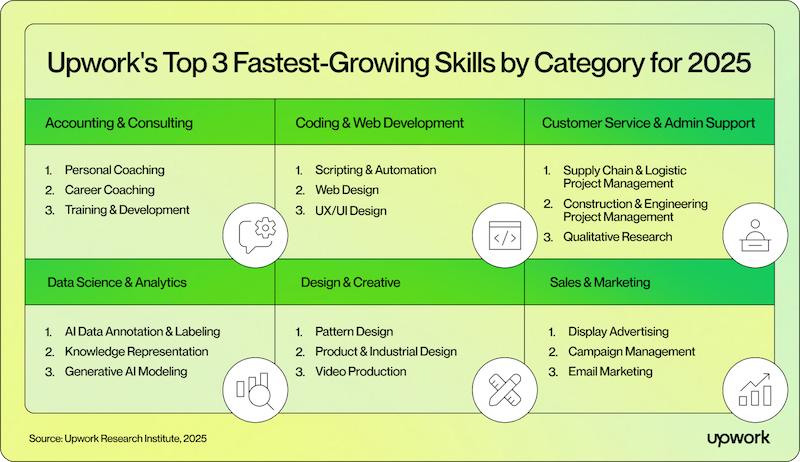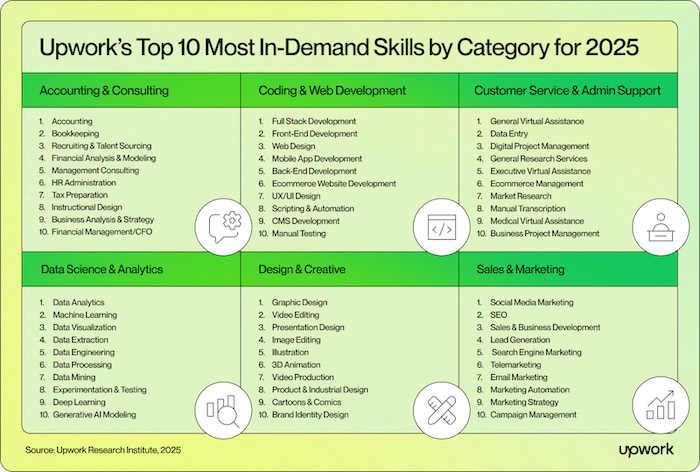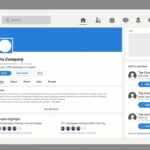Did you know that Kenya has emerged as a powerhouse in Africa’s online gig scene, experiencing a staggering 216% growth in online freelancers over the past five years? This remarkable growth positions Kenya as the leading gig economy in Africa, surpassing even Nigeria and South Africa. What started as a promising trend has now become a massive opportunity, with Kenya commanding 0.37% of the global freelance market and over 1.2 million Kenyans (5% of the population) now working online.
Online work in Kenya, or rather freelancing, is increasingly becoming popular, especially for young adults and graduates just getting started with their careers. With technology, the rise of Mobile Apps, Websites, Artificial intelligence, and so on, the need for remote jobs in Kenya is constantly evolving and attracting quite a number of Kenyans. The global freelance market is projected to surpass $500 billion in value by 2025, and Kenya is perfectly positioned to capture a significant share of this growth.
The best thing about freelancing is that you can still try it even if you have a typical day-to-day job due to its flexibility. However, with so many opportunities to get started with freelancing, it is not as easy as it seems, as still many of us lack the proper knowledge and skills to navigate the world of working remotely successfully.
Many face fear and anxiety while wanting to explore this route because of their lack of experience. The good news is that when it comes to getting started with freelancing, it is actually easier for you to get a job without even a single experience. But then it also narrows down to whether you want to put in the effort and work to achieve the right skills needed for you to apply for various opportunities.
If this doesn’t make sense to you by now, this is where this comprehensive guide comes in; we will walk through how to become a freelancer in Kenya in 2025.
What Is Freelancing?
A better explanation of what freelancing is really is that it is a kind of self-employment since it does not require one to be involved with full-time employment in order to be paid. Therefore, freelancing is a work arrangement where you offer your services to your client on a project basis in a given time duration.
Being a freelancer is much like being your boss, and it presents numerous benefits, including:
- Flexibility: It provides great work flexibility as you can work from anywhere so long as you can access the internet
- Higher earning potential: It presents higher salaries depending on the projects available as compared to fixed salaries for traditional jobs
- Diverse opportunities: There are many job opportunities that you can work on as long as you have the needed skills, in addition to networking with clients and freelancers in the industry
Interestingly, 31% of people work online because of lack of formal employment, while 21% prefer online work because it provides convenience and flexibility, showing that freelancing serves both necessity and preference.
How To Start Freelancing
Getting started with freelancing is not hard but not easy at the same time, as it requires you to invest your time in having the skills in demand. It is an art that one acquires by reading and practising. So, to help you get started easily, below are the seven-step processes that you should consider taking a look at this year.
1. Identifying Your Skills
The secret to succeeding in any remote job as a freelancer is having the right skills and attitude needed for the role that you are interested in. As for this, it all narrows down to yourself. Think of something that you can easily provide without struggling.
When you identify your skills, you also need to categorize them into hard skills, which include technical capabilities such as writing and coding, or soft skills, which might involve time management, good communication skills, problem-solving skills, and such.
Based on current data from Kenya’s online workforce, the most in-demand skills include:
- Digital marketing (461,253 workers)
- Content writing (250,000 workers)
- Transcription services (141,021 workers)
- Software development (76,291 workers)
- Data science (64,100 workers)


Lastly, search and see whether the skills that you possess are what clients prefer. Many freelancing sites provide you with a talent marketplace where you can see the jobs available and what people are trading. According to research by PayPal, 36% of businesses use freelancers for web design projects, making this the most in-demand freelancing skill globally.
2. Choosing Your Niche
Once you identify your skills and understand market demand, choose a niche that aligns with your interests and potential clients’ needs. To be a successful freelancer, you need to be a good problem solver, as clients are always looking for someone who can solve their problems. Therefore, instead of going for many things at once, limit yourself only to a narrow area, especially on something that you think you are good at or you can be an expert at.
However, be aware that AI-generated content has driven down costs in some areas, with a 25% drop in freelancers’ hourly rates since 2020 in certain niches. Focus on skills that complement AI rather than compete with it directly.
3. Building Your Online Presence
The way the world of freelancing works is that you have to have some proof that shows you are kinda good at what you claim to be an expert at. And this, by the way, applies whether you have experience or not. To stand out, you can start by creating an amazing portfolio that shows the past projects that you have worked on and delivered successfully.
Even if you don’t have any experience, you can include the personal projects that you are working on; for example, if I were looking for a writing gig, I could write a few articles and put them on the platform to show that I am truly the right candidate. The same is true if you are a graphic designer, web developer, etc.
Some of the best platforms that you can use to host your portfolio for potential clients are:
- Behance (for creative work)
- Dribbble (for design portfolios)
- GitHub (for developers)
- Personal website (for all niches)
To win clients, make sure that your portfolio stands out with features such as examples of your work, testimonials from people you have worked with, mockups, and case studies showing your problem-solving process.
4. Marketing Yourself

Having a portfolio does not help you win clients; rather, marketing yourself contributes much to your freelance journey. If you have joined any freelance platform, a good way to market yourself is by setting up your profiles on these various accounts. When you are creating your profile, make sure to have the following in check:
- Choose a clear and professional profile picture to build trust
- Write a very attractive bio that stands out; you can achieve this by including your skills and what makes you unique in your area of interest
- List the services that you offer and be very specific so as to attract the right clients
- Lastly, to make clients easily see your profile, make sure that it is optimized for search; you can try using keywords related to your niche
For example, as a content writer, I would use terms like SEO content writer, blog post writer and so on. If you are having a hard time coming up with relevant terms related to your skills, ChatGPT might be able to help you in this case.
5. Networking and Finding Clients
Freelancing was not a well-explored market in previous years in Kenya. However, with the significant adoption of technology and global availability, finding the right clients can sometimes be quite challenging. Still, it is not as hard as it sounds.
Some of the very best top freelancing platforms preferred by Kenyan freelancers in 2025 are as follows:
- Upwork
- Fiverr
- Toptal
You can also use various social media platforms to win clients; a good example is LinkedIn, known for connecting with professionals and even job searches. To stand out, create a very professional profile, as we have covered in the article, to help you find the right clients.
In addition, join various Facebook groups in Kenya based on the job you are searching for to find common people. Also, try to take a look at the various job boards in Kenya, such as MyJobMag or even BrighterMonday, to find clients.
Finding clients also means that you have to prioritize building relationships rather than focusing on money and work first. Close and mutual relationships can establish trust with your clients, hence leading to referrals that can provide you with many opportunities if they arise.
6. Continue Enhancing Your Skills
It is clear by now that having the right skills is what will make you succeed in the world of freelancing. Therefore, you should remember that clients are always on the lookout for people who stand out with the increasing competition. How can you stand out? First, start by committing yourself to learning constantly.
There are many online platforms today that you can leverage to upskill in what you are interested in and even earn certifications upon completion as an added advantage:
- Coursera
- Udemy
- Brilliant
- LinkedIn Learning
- Skillshare
With 69% of employers surveyed having hired freelancers after layoffs in 2023–2024, and over 99% planning to do so in 2025, continuous skill development is more critical than ever.
7. Joining Professional Communities
A better way to find work and continue learning is to look for people with whom you share a common objective. This platform will not only give you a chance to grow from a beginner to an experienced freelancer but also a chance to be seen by clients who are in the forums. To stand out, don’t be afraid to engage your colleagues, ask questions, engage in community discussions, share what you know, and, most importantly, accept being corrected.
How to Scale a Freelance Business

As much as freelancing provides you with the flexibility to work anywhere and at any time, to be so good, you need to understand how to manage it very well. Below are some of the things that you should also keep in check always:
Setting Rates and Invoicing
When it comes to pricing, you need to understand how it works – you may not want to overcharge or also be underpaid at the same time. Therefore, to be safe, research over and over again to understand the rates that similar freelancers in your niche charge. When you are getting started, it is safe to start with a much lower rate than the rest so as to win clients. Then, with time, you can revise your charges as your worth increases.
Also, master how to create proper invoices for your clients. There are many tools online, including PayPal, that can assist you with that. A good invoice as a freelancer should have the following details:
- Your name and contact information
- Client’s details
- A detailed list of services provided
- Payment terms and due dates
- Tax information (if applicable)
Time Management
When working on various projects as a freelancer, prioritize delivering projects before the set due time as per the terms of the agreement with your client. Late submissions may cement your reputation as unworthy, leading to negative reviews and even the loss of future clients. Therefore, to stay updated, you can use tools like Trello or Asana, which are known for enhancing productivity by helping you track the progress of tasks and deadlines.
Which payment method is best for freelancing?
One of the biggest concerns for Kenyan freelancers is receiving payments from international clients. Here are the most reliable payment methods in 2025:
- PayPal
- Wise
- Skrill
- Payoneer
- M-Pesa Global Card
- Bank transfers
- Cryptocurrency payments
Frequently Asked Questions
Do I need experience to start freelancing in Kenya?
You do need to have experience to be good at freelancing in Kenya. As we have seen in the article, the steps to becoming good at freelancing involve following a seven-step process, which is:
- Identifying Your Skills
- Choosing Your Niche
- Building Your Online Presence
- Marketing Yourself
- Networking and Finding Clients
- Continue Enhancing Your Skills
- Joining Professional Communities
Which freelancing platforms pay through M-Pesa?
While most international freelancing platforms don’t directly integrate with M-Pesa, you can use services like the M-Pesa Global Card to receive payments locally.
What are the most profitable freelancing skills in Kenya for 2025?
Based on current market data, the most profitable skills include:
- Digital marketing
- Web design and development
- Content writing and SEO
- Data science and analytics
- Software development
- Virtual assistance
- Social media management
Wrapping Up
We hope that this article has given you a jumpstart on starting a freelance business in Kenya. The best part about online working is that you can start even if you have no prior experience, making it easy for many to join as long as you are willing to follow the steps that we have covered in this guide.
Remember that success in freelancing requires continuous learning, building professional relationships, and adapting to market changes. Start with one skill, build your reputation gradually, and expand your services as you gain confidence and experience.
We wish you all the best in your freelancing journey. If you need any assistance with getting started, please comment below, and we will guide and assist you in taking your first steps toward freelance success in Kenya’s thriving gig economy.












